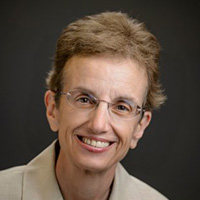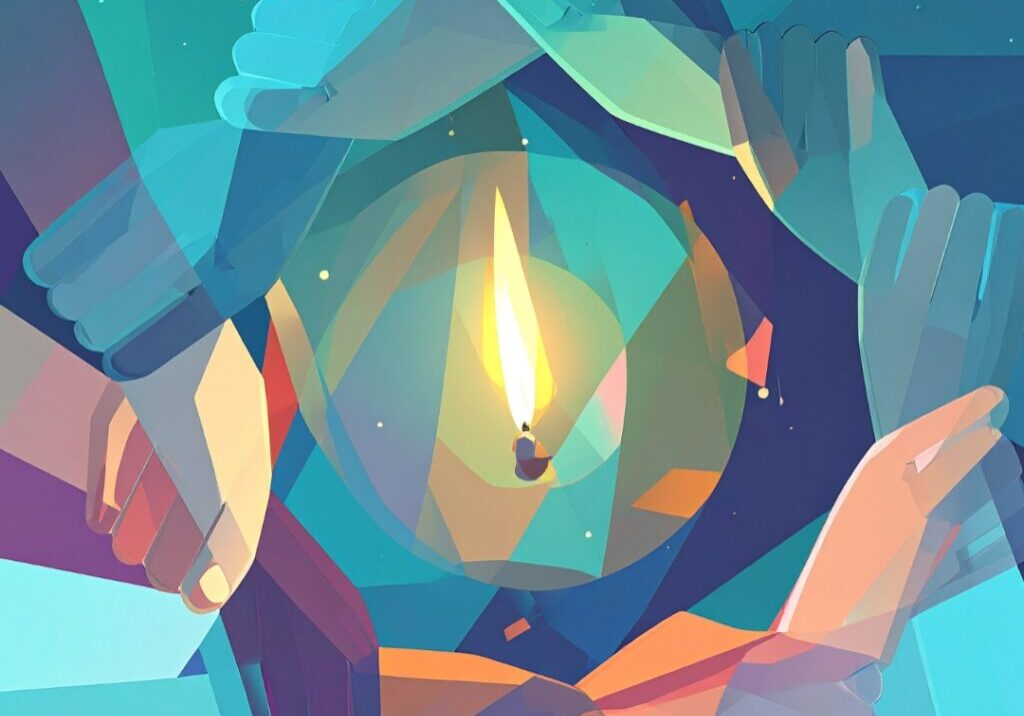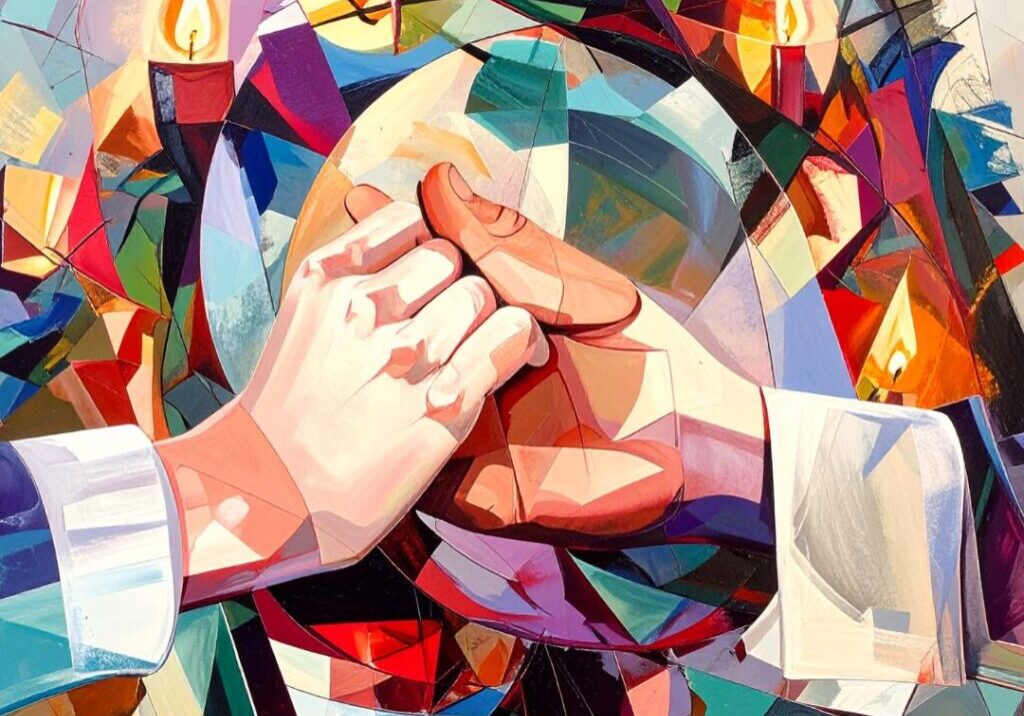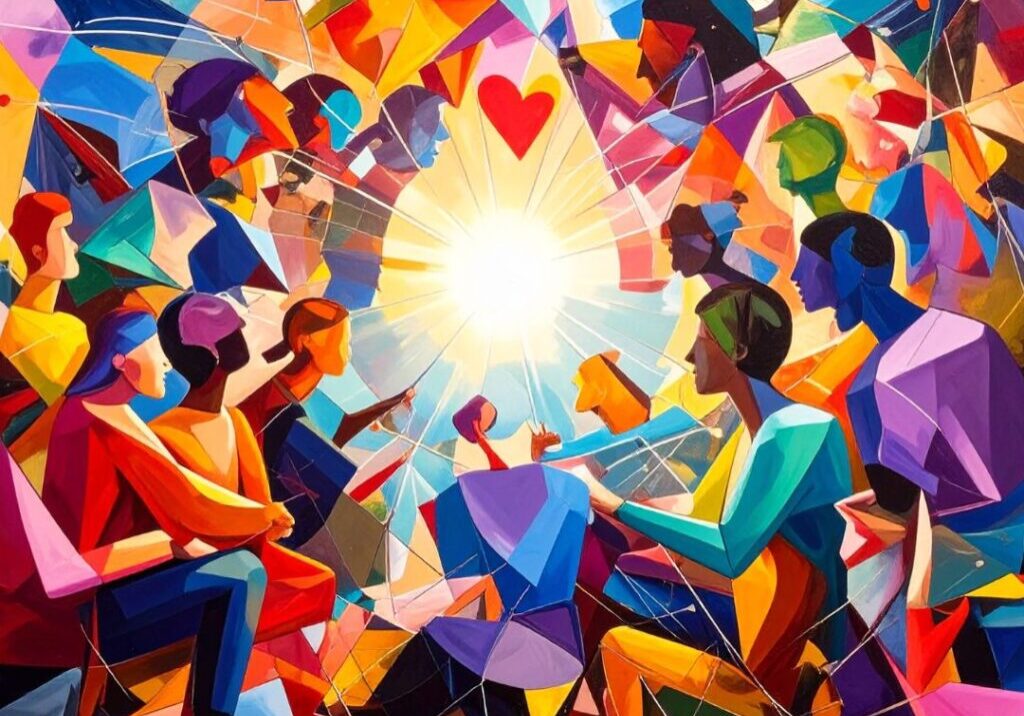Pain and New Creation
Image: Marc Chagall, White Crucifixion,1938
 We are entering into Holy Week, the final days of Jesus’ life, filled with darkness, pain, misunderstanding and rejection. We are familiar with the Scripture passages of Jesus who experienced God’s forsakenness (Mark 15:34) and his realization that death would complete his mission. The events of Jesus’ last days are shrouded in mystery, and yet, we know, in some way, that if we are to follow him, we too will encounter our cross. We have been told that pain is associated with sin and that aligning ourselves with Jesus can lead us to new life. But is there another way to interpret the final days of Jesus that led to his death? Are we missing a deeper dimension of our lives by reducing the passion to sin and death? The Swiss psychiatrist Carl Jung reflected deeply on the person of Jesus Christ as a central symbol of human life. According to Jung, humanity’s relation to divinity lay in its relation to the unconscious as the ground of consciousness and meaning. God is the ground of being. Authentic religion functions in the unconscious by imbuing humanity with a natural sense of the divine. Divinity approaches consciousness from no other source than one’s own inner being. God and human are to be united in human consciousness as the depth meaning of history, both personal and collective. This historical process is at once redemptive of the divine ground and of human consciousness. Identifying Jesus as truly God and truly human is a description of the process of individuation brought to full consciousness, whereby divinity is brought to its completion in humanity through the ego’s transformation in the divine source. In the incarnation, God becomes conscious and is completed by humankind in directed evolution.
We are entering into Holy Week, the final days of Jesus’ life, filled with darkness, pain, misunderstanding and rejection. We are familiar with the Scripture passages of Jesus who experienced God’s forsakenness (Mark 15:34) and his realization that death would complete his mission. The events of Jesus’ last days are shrouded in mystery, and yet, we know, in some way, that if we are to follow him, we too will encounter our cross. We have been told that pain is associated with sin and that aligning ourselves with Jesus can lead us to new life. But is there another way to interpret the final days of Jesus that led to his death? Are we missing a deeper dimension of our lives by reducing the passion to sin and death? The Swiss psychiatrist Carl Jung reflected deeply on the person of Jesus Christ as a central symbol of human life. According to Jung, humanity’s relation to divinity lay in its relation to the unconscious as the ground of consciousness and meaning. God is the ground of being. Authentic religion functions in the unconscious by imbuing humanity with a natural sense of the divine. Divinity approaches consciousness from no other source than one’s own inner being. God and human are to be united in human consciousness as the depth meaning of history, both personal and collective. This historical process is at once redemptive of the divine ground and of human consciousness. Identifying Jesus as truly God and truly human is a description of the process of individuation brought to full consciousness, whereby divinity is brought to its completion in humanity through the ego’s transformation in the divine source. In the incarnation, God becomes conscious and is completed by humankind in directed evolution.
Bringing Jung’s insights to the events of Holy Week leads us to see Jesus as one who, fully conscious of God in his life, opened up to the pain and darkness of the human experience. Only by entering into the darkness of suffering and rejection could Jesus fully know (and thus reveal) the depths of God’s love. For the fullness of Godly life requires that the realm of the unconscious– where the darkness of pain, suffering, rejection linger—be brought to the level of conscious acceptance. Only then is the self released from the ego and fully united with God. The Godliness of Jesus is not found in his human works of mercy and justice but in his ecstatic pain of love. For love to be true requires that one become vulnerable in the face of the other, in order to attain wholeness. The “yes” of Jesus, like the “yes” of Mary, reflects a profound consciousness of God’s presence, the very source of life within. God seeks to become whole in us but such wholeness requires a death of the ego and a rebirth of the self in God. The unconscious, we might say, is God’s self-emptying into the fragile limits of humanity. God suffers with us the conflict and tragedy of life because God desires the wholeness of life, which includes our consent to love. If the Christian God is a God of sacrificial love, then pain—the birth pain which opens to the fullness of life—is Creator pain. A self-sufficient God cannot create out of love, for love longs for union, for the reconciliation of opposites, for wholeness, which self-sufficiency contradicts. Christ-love is sacrificial love which embodies the death-pain of reconciliation with God. Darkness is not the opposite of light but the fullness of light and only by embracing the darkness of our lives [as Jesus did] is God born in us as the light of the world.
The events of Holy Week should not be reduced to a re-enacted drama but must be embraced as our deepest reality. Each of us is called to undergo death if we seek the fullness of life. The death we are called to endure is the death to separation [or the separated self] and toward wholeness. If we truly desire unitive love with God, then we must accept our darkness and what lies there as part of our journey. This is the Christ story in each of us.
The existential philosopher, Bernard J. Boelen spoke of personal crisis as a breakdown and a breakthrough, a “crisis of limits.” Physical suffering and turn of life events reveal these limits. One experiences the pain of the turning point, from an action-oriented existence—dominated by the concern for establishing oneself, for succeeding in life, for doing—to a Being-oriented existence, where one’s vocation is no longer found in what one achieves but in who one is. Boelen suggests that the ultimate “yes” to one’s limits is requisite for opening the door to a maturity of wholeness, never as an accomplished fact, but ever an ongoing process. The lifelong flowering into wholeness is a continuous dying directed toward deeper life, a passing from one existential crisis to another—into greater openness.
Crisis, therefore, including the crisis of Jesus’ Passion, is not an extraordinary moment due to an unfortunate turn of events but part of the totality of Jesus’ dynamic openness to Being. The pain inherent to the existential crisis is a pain inherent in the creation process: the pain of reconciliation, the pain of acceptance and the pain of letting go, all of which are rooted in the pain of God’s dynamic love. Human pain can become creative if it allows one to open up and surrender the heart to the yearning heart of God. Such pain is redemptive, for the pain of acknowledging one’s limits opens the person to freedom, a releasement into the embrace of life itself. In acknowledging our limits we take up the cross of our own poverty; we become childlike; we allow the ego to surrender to the self; the crucifier [the ego] embraces the crucified [the true self]. Only in this way are we oriented toward the fullness of life in God. As Bonaventure wrote: “There is no other path than through the burning love of the Crucified.” Holiness is the dynamic process of maturing love. In the words of Barbara Fiand: “In sacrificial love we are holiness on the way.”
 View print-friendly version
View print-friendly version
6 Comments
Related Posts

Rewiring Our Lives Together, the Franciscan Way
The Season of Incarnation We are in the season of Incarnation—God becoming flesh. It is a beautiful time of the year that brings out the best of humanity, even in…


[…] “The events of Holy Week should not be reduced to a re-enacted drama but must be embraced as our deepest reality. Each of us is called to undergo death if we seek the fullness of life. The death we are called to endure is the death to separation [or the separated self] and toward wholeness. If we truly desire unitive love with God, then we must accept our darkness and what lies there as part of our journey. This is the Christ story in each of us.” —Ilia Delio, “Pain and New Creation” […]
thank you. i found this very enlightening.
Thank you ilia. I hope your own suffering has lessened while it carries you on your journey. I read your material whenever I can and send articles or just quotes to others so that they may be able to experience Christogenesis in a personal way.
May the Triduum fill you with blessings and increase your generosity penetration of the divine mystery.
Peace.
Thanks Ilia, great explanation of the inner (spiritual) meaning of the paschal mystery, as opposed to the traditional (religious-seasonal) one of the passion drama. There’s room for both, Jesus as a man who died on a Roman gibbet in a moment of time, Jesus as God who resurrects/evolves toward the higher version of himself (timeless) via death per se, and in us in a series of successive death/ renewal choreographies in the story of alife. His death, and our successive transformational deaths, amount to a death to separation-consciousness, the altogether human illusion that we and all things are not One in unity at their core. In Kingdom of God (spiritual consciousness) all created elements touch each other by that which is most inward and ultimate in them. As goes a Native American expression, “life is a dream from which death awakens me.” The death referred to is both bodily and egoic.
Thank you. So much there to process as we prepare for the triduum. Thank you for the work you do.
Thank you Ilia! This is EXCELLENT!!